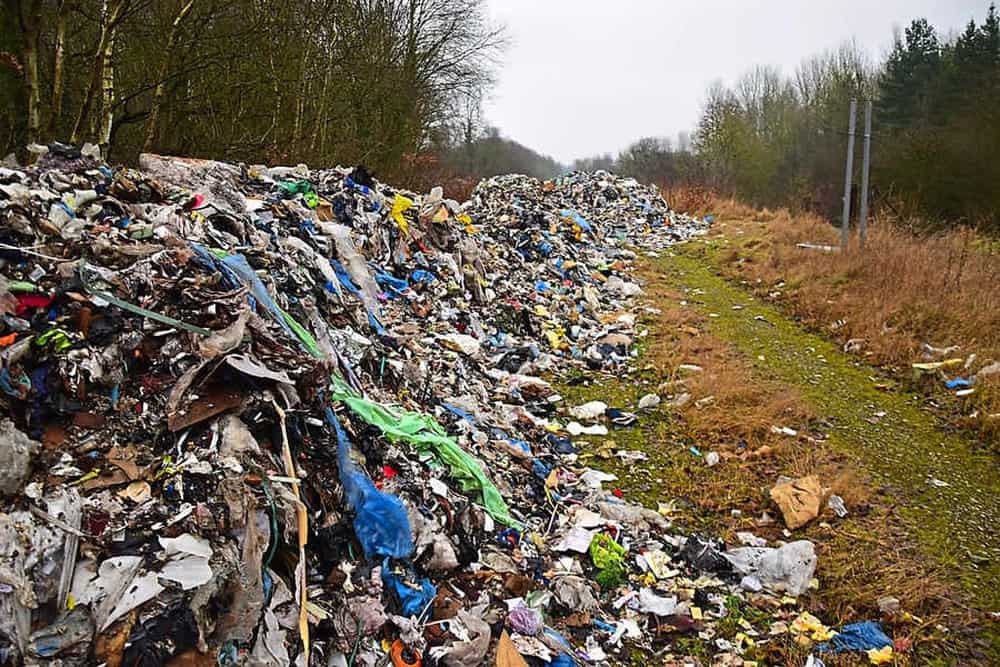Fly-tipping is a serious problem across the UK. It’s the act of illegally disposing of your waste in areas that don’t have a licence to accept it. For example, throwing a bag of rubbish on the side of a road – or even leaving it outside someone else’s house.
It’s estimated that the cost of dealing with fly-tipping waste exceeded £58 million (in England alone) back in 2016/17. That’s a staggering amount of money for a problem that shouldn’t need to exist! The issue is seemingly getting worse, with a 10-year high of over one million reported incidents of fly-tipping in 2019 – an 8% increase from the year before.
Why is fly-tipping a problem?
Fly-tipping is bad for numerous reasons. Firstly, it ruins the way an area looks. This can have consequences on people’s desire to live somewhere, which will ultimately have a knock-on effect on tourism and the local economy.
Furthermore, throwing waste in random areas can disrupt wildlife in that area. Animals may have homes ruined by huge bin bags or dirty mattresses. They may also start eating things that get thrown away, causing them to get sick and die out.
Of course, as mentioned already, there’s the financial problem fly-tipping causes. It costs the government millions of pounds every single year.
Not to forget the fact that it’s also terrible for the environment. People who fly-tip will usually throw things away that could be sent to plastic recycling centres, or re-purposed for other means. Instead, they’re collected up and dumped in landfills.
How has fly-tipping become a big issue?
There’s no definitive answer for how this has become such a considerable problem. The fact is that the number of fly-tipping incidents continues to rise – despite the fact that it is seen as a criminal offence. It’s simply too easy for people to dump waste on the side of a road, or go down a back alley and leave things there.
However, part of the problem may stem from the increasingly confusing rules surrounding waste disposal and recycling. In the past, there weren’t any strict rules regarding recycling in the UK. It was more a case of, if you want to do it, then you can. So, people knew they could just put all their waste in a black bin bag, stick as many as they liked outside their home, and it would all be collected.
Now, new rules and regulations are in place throughout the country. For example, in the Vale of Glamorgan (Wales), people can only have two black bin bags that get collected every two weeks. Everything else needs to be recycled, and the council is even introducing split recycling – which means things have to be separated into different boxes for collection on different days. A similar thing is happening around the UK; local councils are trying to decrease the amount of non-recyclable household waste by enforcing stricter recycling laws.
In theory, this should encourage households to recycle more and more. However, an environmental charity called Keep Britain Tidy found that most people are overwhelmed by all these changes and rules. They don’t know what can be recycled, where it can be recycled, what they can put in black bin bags, and so on.
As a consequence, people resort to fly-tipping as it’s just easier for them. Why waste time trying to figure out what can be recycled when you can just collect everything in one bag and dump it whenever you like?
How is fly-tipping being combated?
The good news is that various councils are looking to fight the war on fly-tipping. Primarily, the focus is on education. Clearly, people struggle to understand what to recycle and where they can dispose of certain items. Bolton is an area with a considerable fly-tipping problem, and they introduced various initiatives aimed at explaining to local residents the dangers of fly-tipping, what can happen if they get caught, and how they should legally dispose of waste.
A similar approach is being taken by local councils around the UK. Not only that, but there’s increased diligence on catching people in the act of fly-tipping. Environmental Crimes Investigations Officers are working with local CCTV companies to spot people who fly-tip, then clamp down on it. By making examples of people who commit this crime, it’s hoped others will realise that it’s not worth the risk.
Overall, fly-tipping is more severe than you might think. It causes destruction and damage to local eco-systems and wastes millions of pounds every year. To fight this war, the best approach seems to be education. Help people understand new recycling and waste disposal laws, so they can change their behaviours. Combine this with a zero-tolerance approach to fly-tipping, and people will slowly start to understand the problem and the consequences that await them.







